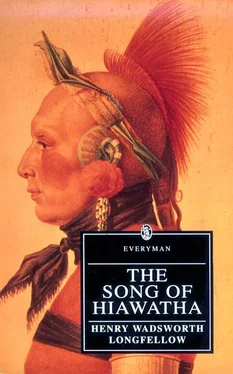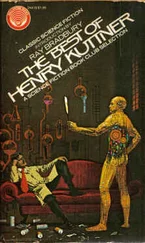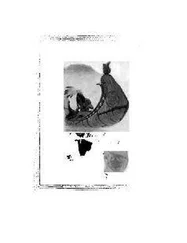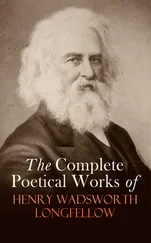Thus he taught the game of hazard,
Thus displayed it and explained it,
Running through its various chances,
Various changes, various meanings:
Twenty curious eyes stared at him,
Full of eagerness stared at him.
"Many games," said old Iagoo,
"Many games of skill and hazard
Have I seen in different nations,
Have I played in different countries.
He who plays with old Iagoo
Must have very nimble fingers;
Though you think yourself so skilful,
I can beat you, Pau-Puk-Keewis,
I can even give you lessons
In your game of Bowl and Counters!"
So they sat and played together,
All the old men and the young men,
Played for dresses, weapons, wampum,
Played till midnight, played till morning,
Played until the Yenadizze,
Till the cunning Pau-Puk-Keewis,
Of their treasures had despoiled them,
Of the best of all their dresses,
Shirts of deer-skin, robes of ermine,
Belts of wampum, crests of feathers,
Warlike weapons, pipes and pouches.
Twenty eyes glared wildly at him,
Like the eyes of wolves glared at him.
Said the lucky Pau-Puk-Keewis:
"In my wigwam I am lonely,
In my wanderings and adventures
I have need of a companion,
Fain would have a Meshinauwa,
An attendant and pipe-bearer.
I will venture all these winnings,
All these garments heaped about me,
All this wampum, all these feathers,
On a single throw will venture
All against the young man yonder!"
`T was a youth of sixteen summers,
`T was a nephew of Iagoo;
Face-in-a-Mist, the people called him.
As the fire burns in a pipe-head
Dusky red beneath the ashes,
So beneath his shaggy eyebrows
Glowed the eyes of old Iagoo.
"Ugh!" he answered very fiercely;
"Ugh!" they answered all and each one.
Seized the wooden bowl the old man,
Closely in his bony fingers
Clutched the fatal bowl, Onagon,
Shook it fiercely and with fury,
Made the pieces ring together
As he threw them down before him.
Red were both the great Kenabeeks,
Red the Ininewug, the wedge-men,
Red the Sheshebwug, the ducklings,
Black the four brass Ozawabeeks,
White alone the fish, the Keego;
Only five the pieces counted!
Then the smiling Pau-Puk-Keewis
Shook the bowl and threw the pieces;
Lightly in the air he tossed them,
And they fell about him scattered;
Dark and bright the Ozawabeeks,
Red and white the other pieces,
And upright among the others
One Ininewug was standing,
Even as crafty Pau-Puk-Keewis
Stood alone among the players,
Saying, "Five tens! mine the game is,"
Twenty eyes glared at him fiercely,
Like the eyes of wolves glared at him,
As he turned and left the wigwam,
Followed by his Meshinauwa,
By the nephew of Iagoo,
By the tall and graceful stripling,
Bearing in his arms the winnings,
Shirts of deer-skin, robes of ermine,
Belts of wampum, pipes and weapons.
"Carry them," said Pau-Puk-Keewis,
Pointing with his fan of feathers,
"To my wigwam far to eastward,
On the dunes of Nagow Wudjoo!"
Hot and red with smoke and gambling
Were the eyes of Pau-Puk-Keewis
As he came forth to the freshness
Of the pleasant Summer morning.
All the birds were singing gayly,
All the streamlets flowing swiftly,
And the heart of Pau-Puk-Keewis
Sang with pleasure as the birds sing,
Beat with triumph like the streamlets,
As he wandered through the village,
In the early gray of morning,
With his fan of turkey-feathers,
With his plumes and tufts of swan's down,
Till he reached the farthest wigwam,
Reached the lodge of Hiawatha.
Silent was it and deserted;
No one met him at the doorway,
No one came to bid him welcome;
But the birds were singing round it,
In and out and round the doorway,
Hopping, singing, fluttering, feeding,
And aloft upon the ridge-pole
Kahgahgee, the King of Ravens,
Sat with fiery eyes, and, screaming,
Flapped his wings at Pau-Puk-Keewis.
"All are gone! the lodge Is empty!"
Thus it was spake Pau-Puk-Keewis,
In his heart resolving mischief
"Gone is wary Hiawatha,
Gone the silly Laughing Water,
Gone Nokomis, the old woman,
And the lodge is left unguarded!"
By the neck he seized the raven,
Whirled it round him like a rattle,
Like a medicine-pouch he shook it,
Strangled Kahgahgee, the raven,
From the ridge-pole of the wigwam
Left its lifeless body hanging,
As an insult to its master,
As a taunt to Hiawatha.
With a stealthy step he entered,
Round the lodge in wild disorder
Threw the household things about him,
Piled together in confusion
Bowls of wood and earthen kettles,
Robes of buffalo and beaver,
Skins of otter, lynx, and ermine,
As an insult to Nokomis,
As a taunt to Minnehaha.
Then departed Pau-Puk-Keewis,
Whistling, singing through the forest,
Whistling gayly to the squirrels,
Who from hollow boughs above him
Dropped their acorn-shells upon him,
Singing gayly to the wood birds,
Who from out the leafy darkness
Answered with a song as merry.
Then he climbed the rocky headlands,
Looking o'er the Gitche Gumee,
Perched himself upon their summit,
Waiting full of mirth and mischief
The return of Hiawatha.
Stretched upon his back he lay there;
Far below him splashed the waters,
Plashed and washed the dreamy waters;
Far above him swam the heavens,
Swam the dizzy, dreamy heavens;
Round him hovered, fluttered, rustled
Hiawatha's mountain chickens,
Flock-wise swept and wheeled about him,
Almost brushed him with their pinions.
And he killed them as he lay there,
Slaughtered them by tens and twenties,
Threw their bodies down the headland,
Threw them on the beach below him,
Till at length Kayoshk, the sea-gull,
Perched upon a crag above them,
Shouted: "It is Pau-Puk-Keewis!
He is slaying us by hundreds!
Send a message to our brother,
Tidings send to Hiawatha!"
XVII
The Hunting of Pau-Puk-Keewis
Full of wrath was Hiawatha
When he came into the village,
Found the people in confusion,
Heard of all the misdemeanors,
All the malice and the mischief,
Of the cunning Pau-Puk-Keewis.
Hard his breath came through his nostrils,
Through his teeth he buzzed and muttered
Words of anger and resentment,
Hot and humming, like a hornet.
"I will slay this Pau-Puk-Keewis,
Slay this mischief-maker!" said he.
"Not so long and wide the world is,
Not so rude and rough the way is,
That my wrath shall not attain him,
That my vengeance shall not reach him!"
Then in swift pursuit departed
Hiawatha and the hunters
On the trail of Pau-Puk-Keewis,
Through the forest, where he passed it,
To the headlands where he rested;
But they found not Pau-Puk-Keewis,
Only in the trampled grasses,
In the whortleberry-bushes,
Found the couch where he had rested,
Found the impress of his body.
From the lowlands far beneath them,
From the Muskoday, the meadow,
Pau-Puk-Keewis, turning backward,
Made a gesture of defiance,
Made a gesture of derision;
And aloud cried Hiawatha,
From the summit of the mountains:
"Not so long and wide the world is,
Not so rude and rough the way is,
But my wrath shall overtake you,
And my vengeance shall attain you!"
Читать дальше












